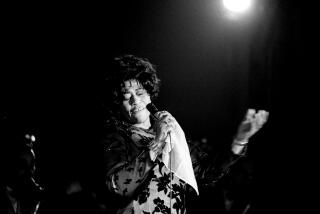Edmund B. Fitzgerald dies at 87; known for baseball, shipwreck ties
- Share via
Baseball historians know him as a businessman who helped bring Major League ball back to Milwaukee, but Edmund B. Fitzgerald is better known for his family connection to one of America’s most famous shipwrecks.
All 29 sailors on the freighter Edmund Fitzgerald drowned in Lake Superior on Nov. 10, 1975. The next year, they were memorialized in Gordon Lightfoot’s haunting ballad, “The Wreck of the Edmund Fitzgerald.”
The reasons for the wreck are still uncertain, but its legacy followed Fitzgerald throughout his life.
In 1958, his mother, Elizabeth Fitzgerald, christened the massive iron ore freighter, whacking it three times before her champagne bottle broke. The $8-million ship had been commissioned by Fitzgerald’s father, an insurance magnate also named Edmund, whose board of directors honored him by putting his name on one of the largest ships ever to navigate the Great Lakes.
The younger Fitzgerald, sometimes called “young Ed” to distinguish him from his father, died Aug. 28 of natural causes at his home in Nashville, his family said. He was 87.
On the 30th anniversary of the wreck in 2005, he recalled meeting Lightfoot at a dinner hosted by the Canadian prime minister in the 1980s.
“I told him what my name was, and he looked rather surprised,” Fitzgerald said of the Canadian singer-songwriter. Fitzgerald called Lightfoot’s homage to the ship a “fine song.”
The legacy of the shipwreck was never far from his mind. The launch, witnessed by a crowd of 15,000, was the happiest day of his father’s life, he once said. And the day of the wreck, when 25-foot waves and near-hurricane-force winds roiled Lake Superior, was “probably the worst day of my father’s life.”
His father, chairman of Northwestern Mutual Life Insurance Co., had not wanted his name on the ship, relatives said after his death in 1986. The board voted on it after he left the room.
Edmund Bacon Fitzgerald was born in Milwaukee on Feb. 5, 1926. He earned a bachelor’s degree in electrical engineering from the University of Michigan and in 1946 joined Cutler-Hammer, a Milwaukee-based electrical products manufacturer founded by his grandfather Frank R. Bacon. He served in the U.S. Marine Corps during World War II and again during the Korean War.
He had deep maritime roots in the Great Lakes area. His great-grandfather and his great-grandfather’s five brothers all had been captains of Great Lakes sailing vessels. His grandfather William Edmund Fitzgerald ran the Milwaukee Drydock Co., which built and repaired ships on the Kinnickinnic River.
Fitzgerald was one of four men who led the long fight to get another baseball franchise for Milwaukee after the Braves left for Atlanta after the 1965 season. One of the other four, Bud Selig, was a Milwaukee car salesman who became president of the new Brewers franchise and baseball commissioner.
The Brewers started playing in Milwaukee in 1970. At the time, he said his task in drawing a team to the city amounted to a sales job. He was a Brewers vice president and the team’s chairman of the board until 1982.
He also served for several years as a member of the executive council of Major League Baseball and was chairman of the player relations committee.
Fitzgerald was chairman and chief executive of Cutler-Hammer when the firm was bought by Eaton Corp. in 1979. He had fought to keep Cutler-Hammer an independent company and resigned less than six months after the takeover.
After working for a year as a consultant, he was tapped in 1980 to lead Northern Telecom, a Canadian telecommunications company that became a multibillion-dollar global leader in its field. Fitzgerald served on President Reagan’s National Telecommunications Security Advisory Council.
For many years, he and his wife, Elizabeth, lived in Toronto and Nashville, where the firm had its U.S. headquarters. He retired in 1990, taught management courses for a time at Vanderbilt University in Nashville and founded a business advisory service firm.
Fitzgerald’s wife died in 2012. He is survived by four children and nine grandchildren.
More to Read
Start your day right
Sign up for Essential California for the L.A. Times biggest news, features and recommendations in your inbox six days a week.
You may occasionally receive promotional content from the Los Angeles Times.






